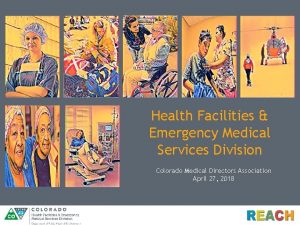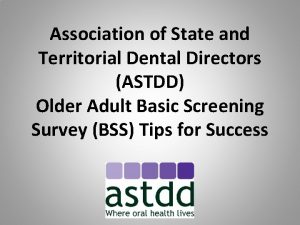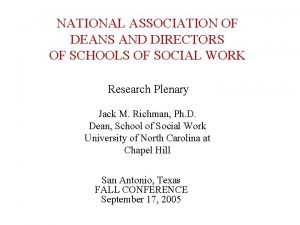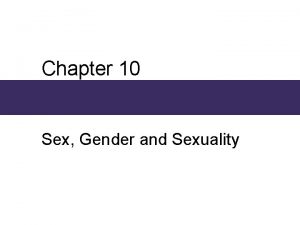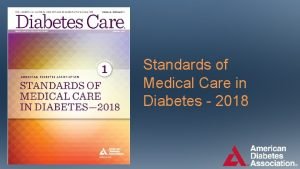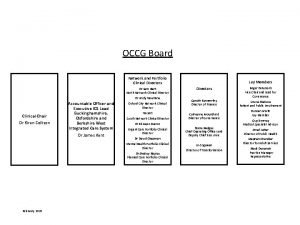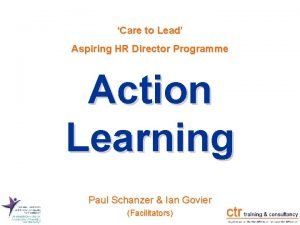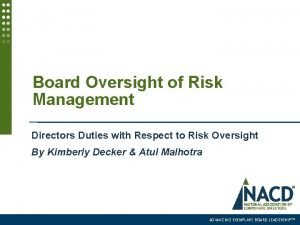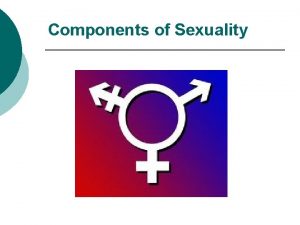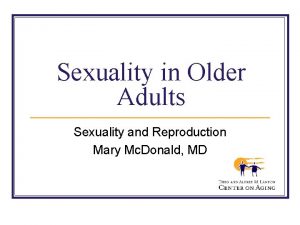Colorado Medical Directors Association August 7 2018 Sexuality


















![Statutory Authority • “As the [Social Security] Act provides, a resident is to receive Statutory Authority • “As the [Social Security] Act provides, a resident is to receive](https://slidetodoc.com/presentation_image_h2/f8e515c074110fc996f4895a02e4d825/image-19.jpg)



















- Slides: 38

Colorado Medical Directors Association August 7, 2018 Sexuality and Dementia in Long-Term Care: Balancing Residents' Rights and Resident Safety Alan C. Horowitz, Esq. , RN Arnall Golden Gregory, LLP alan. horowitz@agg. com 1 (404) 873 -8138

Objectives § Identify clinical & legal risks associated with cognitively impaired nursing home residents who are or desire to be sexually active. § Detail successful strategies for protecting resident rights and safety while avoiding legal liability. § Discuss ethical issues relevant to sexuality in the postacute and long term care setting. § Identify resources relevant to intimacy & sexuality. 2

Sexuality & Cognitively Impaired Residents • • • Can a resident with dementia consent to sexual intimacy with another? What if the resident mistakenly believes another resident is her/his spouse? What are the rights of the resident(s)? What are the obligations of the facility? How can facilities mitigate, if not eliminate risks of liability while respecting resident rights? 3 3

Two Recent Cases Illustrate the Problem for SNFs • State of Iowa v. Henry Rayhons • Windmill Manor Nursing Home, Coralville, Iowa – In the Matter of Steve Drobot, NHA – In the Matter of Karen Etter, DON 4 4

Marriage of Mr. & Mrs. Rayhons 5


State of Iowa v. Henry Rayhons • • May 15, 2014 Care Plan Meeting – SNF informs Mr. Rayhons that his wife “did not have the cognitive ability to consent to sexual activity. ” (Wife had dementia. ) May 23, 2014 Roommate complains that she heard noises indicative of sexual activity between Mr. & Mrs. Rayhons. Camera records Mr. Rayhons placing wife’s undergarments in hamper SNF contacts law enforcement (DNA match – semen/quilt) Mr. Rayhons admits to sexual intercourse with wife Mr. Rayhons charged with “Sexual Abuse in the 3 rd Degree” (Class C Felony). Not guilty verdict (May 2015) 7 7

Not Guilty! 8

Windmill Manor Nursing Home • • • MR - 78 y/o former college professor FR - 87 y/o retired secretary Both MR & FR had dementia • November 17, 2009 Incident – MR & FR in bed together (both naked from waist down) • December 25, 2009 Incident – Residents found having intercourse 9 9

Windmill Manor Nursing Home • DON informed of possible sexual abuse between 2 residents in dementia unit • Late entry in nurses’ notes falsely stating exam conducted on female resident • DON instructed staff to chart inaccurate note following allegation of sexual abuse (same two residents) 10 10

Windmill Manor Nursing Home • DON charged with: “unethical conduct” “failure to assure that nursing care provided under her supervision was adequate and delivered appropriately, ” “failing to assess, accurately document, or report the status of a patient” and “committing an act which caused physical, emotional injury to the patient. ” • NHA charged with: 1) Professional incompetence; 2) Negligence; 3) Violation of a regulation. 11 11

Aftermath: Windmill Manor Nursing Home • • DON fired – “It ruined my life. ” NHA fired – “It’s the most difficult thing I’ve ever had to live through. ” State survey agency claims “sexual assault” CMP issued Male resident (MR) discharged (2 hours from family) Female resident’s family sues nursing home Negative publicity for nursing home, others Complete lose-lose situation • Source: Bloomberg News, Boomer Sex With Dementia Foreshadowed in Nursing Home, July 22, 2013 12 12

Total Nursing Home Residents – Approx. 1. 6 million § Percentages of sexually active adults by age group – New England Journal of Medicine § § § 57 – 63 years 65 – 74 years 75 – 85 years 73% 53% 26% 13

What our concept of “sex” may include § § § § Intimacy and Sexuality Spirituality Personal Growth Genuine emotional interaction Touch, smell, vision Sexual and gender identity, etc. Important collectively in terms of rights Sexuality and Intimacy do not necessarily involve intercourse 14

CMS Final Rule 15

CMS Guidance to Surveyors § When investigating an allegation of sexual abuse, the facility must conduct a thorough investigation to determine the facts specific to the case investigated, including whether the resident had the capacity to consent and whether the resident actually consented to the sexual activity. § A resident’s voluntary engagement in sexual activity may appear to mean consent to the activity; in these instances, if the facility has reason to suspect that the resident may not have the capacity to consent, the facility must protect the resident from potential sexual abuse while the investigation is in progress. 16

State Operations Manual § Interpretive Guidelines § 483. 10(a)(1) § Exercising rights means that residents have autonomy and choice, to the maximum extent possible, about how they wish to live their everyday lives and receive care, subject to the facility’s rules, as long as those rules do not violate a regulatory requirement. 17 17

State Operations Manual “Whenever there appears to be a conflict between a resident’s right and the resident’s health or safety, determine if the facility attempted to accommodate both the exercise of the resident’s rights and the resident’s health, including exploration of care alternatives through a thorough care planning process in which the resident may participate. ” CMS Interpretive Guidelines § 483. 10(d)(3) 18 18
![Statutory Authority As the Social Security Act provides a resident is to receive Statutory Authority • “As the [Social Security] Act provides, a resident is to receive](https://slidetodoc.com/presentation_image_h2/f8e515c074110fc996f4895a02e4d825/image-19.jpg)
Statutory Authority • “As the [Social Security] Act provides, a resident is to receive services with reasonable accommodation of individual needs and preferences ‘except where the health or safety of the individual or other residents would be endangered. . ’ Act § 1819(c)(1)(A)(v)(I). ” • Azalea Court v. CMS, CR 2134 (2010) 19 19

Sexual Intimacy & Dementia • • • Resident - resident (includes same-sex couples) Resident - employee Resident - former employee Resident - spouse Resident - non-spouse • Practice tip: Ongoing documented evaluation of capacity to consent is critical. 20 20

Normal vs. Abnormal Sexual Behavior • Obtaining adequate history of present illness – – – • What is context, how frequent? Is it a problem? For whom? Other medical history Attention seeking behavior? Could this be normal? Something else explain the behavior? Is it being misinterpreted? Sexual activity/impulses/behavior can be normal – Often more biologic/emotional than intellectual – Normal behavior often misinterpreted as abnormal 21

Determining Decision-Making Capacity (DMC) Sexual Consent Capacity 22 22

P. Lichtenberg: Questions to Assess Sexual Consent Capacity (cited in ABA/APA Handbook, p. 67) 1. a. b. c. 2. a. b. 3. a. b. Resident’s awareness of relationship Is the resident aware of who is initiating sexual contact? Does the resident believe the other person is a spouse and, thus, acquiesces out of a delusional belief, or is he/she cognizant of the other’s identity and intent? Can the patient state what level of sexual intimacy she/he would be comfortable with? Resident’s ability to avoid exploitation Is the behavior consistent with formerly held beliefs/values? Does the resident have the capacity to say “no” to uninvited sexual contact? Resident’s awareness of potential risks Does the resident realize that this relationship may be time limited? Can the resident describe how he/she will react when the relationship ends? 23

Determining Competency and Capacity • Competency is a legal determination • Capacity is a clinical determination • Both may be transient • Practice tip: Decision-making capacity (DMC) may wax and wane; it is not necessarily static and neither should the assessment be. 24 24

Capacity for Sexual Consent in Dementia n No universally accepted criteria for capacity to consent to sexual activity n Legal standards and criteria vary across states n No legal standard for the assessment process n No specific assessment tools for assessment Lyden, 2007 and Stavis, et al, 1999 in ABA-APA (2008) Assessment of Older Adults: Psychologist Handbook 25 25

Capacity for Sexual Consent Consultation • Generally Includes: – – – – Evaluation of psychosocial history Review of medical and psychiatric records Clinical interview & behavioral observations Medication review Functional capacity assessment Cognitive & mood assessment Collateral interviews Other information as deemed necessary • Refined skills in use of neuropsychological assessment instruments 26 26

Salient Assessment Factors • Time of day, place of assessment – Stimulus free environment; no 3 rd party observers • Is resident rested and sufficiently able to participate in assessment? – (hearing/vision/language intact? ) • Clinician objectivity • Standardized testing procedures • Attention to cultural issues – Assessment in primary language? – Is interpreter needed? 27 27

MMSE 28

Sexual Aggression in LTC • Survey of 300 NHs in 3 states: 17 -25% of NH residents had unpleasant experiences from hypersexual behavior of other residents; 20 -30% of these required staff intervention (1) • 60 -67% of victims of elder sexual abuse have dementia (2) • 3 -7% of NHs house an identified sex offender (3) 1. Holmes D et al. Int J Ger Psych 1997; 12: 695 -701. Cited in Rosen et al. JAGS 2010; 58: 1070 -1079. Ramsey-Klawsnik et al. J Elder Abuse and Neglect 2008; 20: 353 -376. Burgess et al. JAGS 2006; 54: 1154 -1155. Cited in Rosen, et al. Corson TR, Nadash P. JAMDA 2013; 14: 787 -790. 2. 3. 29


Perspectives of Family Members with Loved Ones in LTC on Sexual Consent in Dementia “Residents can go so far, but not all the way” • Families want residents to have happiness and quality of life • Mixed opinions on capacity to consent to intercourse in dementia “It’s difficult for the staff to cope” • Families are sympathetic to the dilemmas faced by nursing staff • Perceived lack of training, lack of time, and legal jeopardy for staff “We need to know what’s going on” • Families are consistently adamant that they should be informed • Some assert it is their legal right • Some cite the pain of being surprised when they find out Bauer et al. Dementia 2014; 13: 571 -585. 31

LTC Sexuality Policies § 2013 AMDA Sexuality survey – N = 175, mostly CMDs § 30% Formal training re intimacy/sexuality in LTC 23% Institutional policies 13% Staff training 2015 national survey re: sexual activity in LTC – N = 366 Directors of Nursing – Total Policies – 135 Written policies – 78 Policies are not uniform Bach & Meyers (2013). AMDA. Lester, et al. (2016). Sex in Nsg Homes: Policies Governing Sexual Activity. JAMDA. 17: 71 -74. 32 32

Policies & Procedures 33 33

Tips for Policies and Procedures • Create & disseminate clearly written P & P – Include on web site & in marketing materials • Educate administrators, providers, staff, residents, families • Provide ongoing in-service education for staff • Reinforce sensitivity training & support for policy implementation • Include policies in admission package to resident & family. • Optimize communication among all stakeholders 34 34

What can a Facility do to minimize, if not eliminate liability? • The first step is recognizing the potential problems • Learn from others’ mistakes (Lessons Learned) • Be proactive • Continue to evaluate your approach, revise PRN 35 35

Recommendations • • Recognize the issues concerning sexual activity and residents with dementia Educate staff (resident rights-resident safety) Develop appropriate policies and procedures Understand that decision-making capacity (DMC) may wax and wane Assessments must be fluid, not static (MMSE, BIMS, other) Care Plan accordingly Involve IDT Involve all appropriate stakeholders (LTC Ombudsman, religious leaders, family, medical director/attending, psychiatrist, social worker, other) 36 36

Recommendations • • Document all pertinent information (assessments, discussions, care plan, etc. ) Engage QAPI Committee Involve Facility’s Compliance and Ethics Program Seek input from LTC Ombudsman Ensure that attending and psychologist or psychiatrist have made a clinical determination regarding resident’s ability to consent to intimacy whenever DMC may be an issue Consider offering residents the opportunity to address wishes in an advance directive, “compassion contract” Consult legal counsel as appropriate 37 37

Resources § § § § AMDA Clinical Practice Guide (CPG) Decision-making capacity (DMC) Alzheimer’s Association Policies & Procedures Concerning Sexual Expression at the Hebrew Home at Riverdale CMS SOM - Resident Rights, Accommodation, Freedom of Choice Sexuality and Long-Term Care: Understanding and Supporting the Needs of Older Adults, Prof. Gayle Appel Doll AMDA Policy: Clin. CLI. 13: Privacy and Sexuality ABA/APA Publication, Assessment of Older Adults with Diminished Capacity: A Handbook for Lawyers 38 38
 Colorado medical directors association
Colorado medical directors association Association of state and territorial dental directors
Association of state and territorial dental directors National association of deans and directors
National association of deans and directors Thai institute of directors association
Thai institute of directors association National association of state medicaid directors
National association of state medicaid directors Colorado association of school business officials
Colorado association of school business officials Colorado pilots association
Colorado pilots association Colorado guardianship association
Colorado guardianship association Dada la siguiente secuencia rusia 2018 rusia 2018
Dada la siguiente secuencia rusia 2018 rusia 2018 Sexuality in advertising
Sexuality in advertising Definition of sexuality
Definition of sexuality Pretest: growth, development, and sexuality
Pretest: growth, development, and sexuality Circles of sexuality
Circles of sexuality Definition of sexuality
Definition of sexuality Types of sexual relationships
Types of sexual relationships Which illustrates an emotional aspect of teen sexuality?
Which illustrates an emotional aspect of teen sexuality? Peer sexuality support programme
Peer sexuality support programme Chapter 10 sex gender and sexuality
Chapter 10 sex gender and sexuality Base of uterus
Base of uterus Sexuality spectrum
Sexuality spectrum Androgen insensitivity
Androgen insensitivity Gender and sex difference
Gender and sex difference Standards of medical care in diabetes 2018
Standards of medical care in diabetes 2018 Examples of meta directors
Examples of meta directors Information security presentation to board of directors
Information security presentation to board of directors Namata board of directors
Namata board of directors Role brief
Role brief Joint medical holdings
Joint medical holdings Directors emma wolverson
Directors emma wolverson Compliance presentation to board
Compliance presentation to board Kpmg directors toolkit
Kpmg directors toolkit German expressionist directors
German expressionist directors Clinical directors network
Clinical directors network Lvmh board members
Lvmh board members Aspiring directors programme
Aspiring directors programme Board of directors risk oversight responsibilities
Board of directors risk oversight responsibilities Nancy maher
Nancy maher Perfectionist directors
Perfectionist directors Organizational chart cfo
Organizational chart cfo
